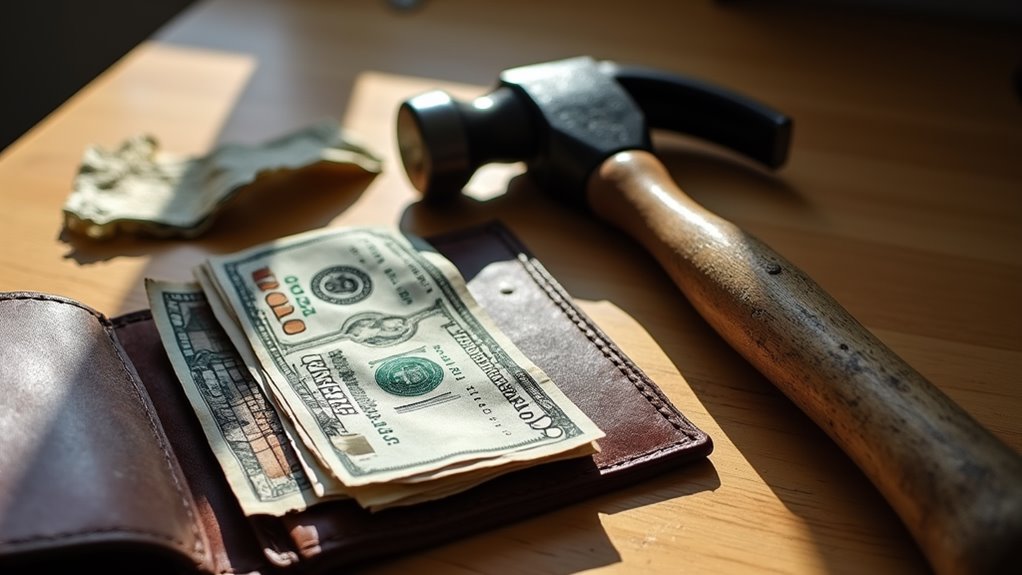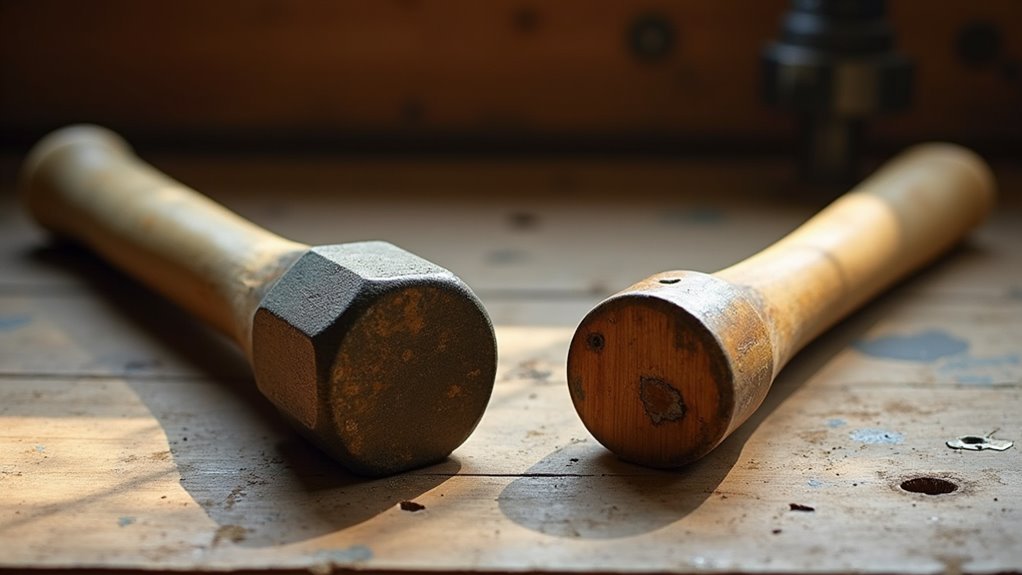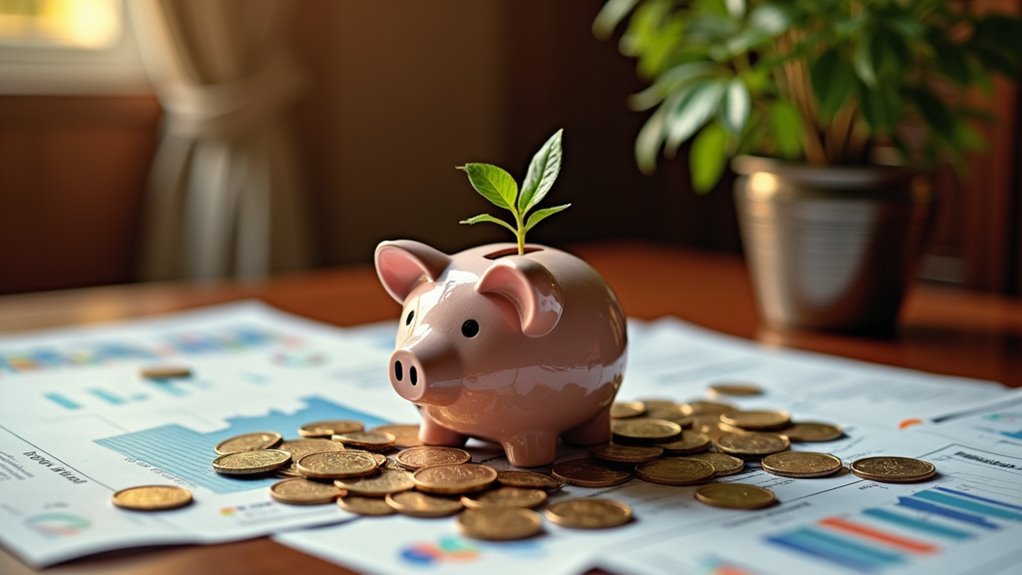Being penny wise but pound foolish can severely impact your financial future. While it's tempting to choose the cheapest option, this often leads to higher long-term costs through frequent replacements and repairs. You'll save more by investing in quality items, maintaining proper insurance coverage, and building emergency funds. Smart financial decisions involve looking at total cost of ownership, diversifying investments, and continuously developing valuable skills. Consider cost-per-use rather than just initial price, and don't skip essential expenses that protect your wealth. Understanding these principles will transform your approach to lasting financial success.
Key Takeaways
- Investing in quality products with longer lifespans reduces overall expenses compared to frequently replacing cheaper, low-quality alternatives.
- Skipping essential insurance coverage or emergency funds leads to devastating financial consequences when unexpected events occur.
- Diversifying investments across multiple asset classes minimizes risk while maximizing long-term returns and financial stability.
- Continuous education and skill development through cost-effective resources directly increases earning potential and career advancement opportunities.
- Automating financial tasks and conducting regular budget reviews helps maintain consistent habits for sustainable wealth accumulation.
Understanding False Economy

Everyone has fallen for the temptation of choosing the cheapest option, only to spend more money in the long run. This common mistake is called false economy – the illusion of saving money while actually incurring greater expenses over time.
You'll spot false economy when you buy low-quality items that need frequent replacement, choose bargain services that deliver poor results, or skip maintenance that prevents costly repairs.
For example, purchasing a $20 pair of work boots that last three months instead of a $100 pair that lasts two years will cost you more annually.
To avoid false economy, you'll need to evaluate purchases based on their total cost of ownership. Consider factors like durability, maintenance requirements, energy efficiency, and replacement frequency before making your decision.
Common Money-Saving Mistakes
You're putting your financial future at risk when you skip essential insurance coverage to save money on monthly premiums.
While shopping for bargains can be smart, choosing the cheapest option for important items like appliances or tools often leads to frequent replacements and higher long-term costs.
It's crucial to balance initial savings against quality and durability, especially for items you'll use regularly or depend on for safety and security.
Skipping Essential Insurance Coverage
While cutting expenses can help build savings, skipping essential insurance coverage is a dangerous financial gamble that could lead to devastating losses. If you're tempted to drop health, auto, homeowners, or disability insurance to save money, consider the potential consequences.
A single medical emergency could wipe out your savings and leave you in debt, while a house fire without coverage might force you into financial ruin.
Instead of eliminating insurance, look for smarter ways to reduce premiums. You can raise deductibles, bundle policies, improve your credit score, or shop around for better rates.
Remember that insurance isn't just an expense – it's a crucial safety net protecting your financial future. The money you save by skipping coverage won't matter if disaster strikes and you're left unprotected.
Ignoring Quality for Price
Searching for rock-bottom prices can actually cost more in the long run when quality is sacrificed.
When you buy cheap appliances, furniture, or clothing, you'll likely need to replace them.
Quality Versus Price

When you're shopping, it's crucial to recognize that higher-priced items often last longer and perform better than their cheaper counterparts.
You'll find that spending more upfront on quality products can actually save you money by reducing replacement and repair costs over time.
The true value of a purchase extends beyond the price tag to include factors like longevity, reliability, and overall satisfaction with the product.
Durability Justifies Higher Costs
Although bargain hunting can save money in the short term, investing in durable, high-quality items often proves more economical over time. When you spend more on well-made products, you'll typically replace them less frequently, reducing your long-term expenses and environmental impact.
Consider a high-end leather briefcase that lasts 15 years versus a cheap synthetic one you'll replace annually. While the leather bag might cost five times more initially, you'll save money by avoiding 14 replacement purchases.
The same principle applies to tools, appliances, and furniture. You'll also benefit from better performance, enhanced reliability, and fewer repair costs throughout the item's lifespan.
Before making purchases, research product durability and calculate the cost per use. This approach helps you make informed decisions that balance immediate costs with long-term value.
Value Beyond Initial Price
Value extends far beyond the price tag on any purchase you make. When you're assessing costs, you'll need to consider factors like maintenance requirements, energy efficiency, and potential resale value.
A higher-priced item that lasts longer and performs better can save you money over time. You'll find that quality items often come with better warranties, superior customer service, and enhanced features that improve your experience.
They're typically made with better materials and craftsmanship, which means fewer repairs and replacements. Consider how a well-made appliance might use less electricity or how premium tools can help you work more efficiently.
When you factor in these long-term benefits, you'll often discover that paying more upfront can be the smarter financial decision.
The Hidden Cost of Bargains
While bargain hunting can lead to immediate savings, many discounted items come with long-term costs that aren't apparent at checkout.
You might save money on cheap appliances, but they often break down faster and need frequent replacements. Low-quality clothing typically wears out quickly, forcing you to buy replacements more often than if you'd invested in durable pieces.
Consider the maintenance expenses too.
That discounted printer might seem like a steal until you discover its inefficient ink consumption. Similarly, a bargain vacuum cleaner could cost you more in repairs and reduced cleaning effectiveness.
The key is to evaluate the total cost of ownership, including maintenance, durability, and replacement frequency.
Sometimes, paying more upfront for quality items will save you money and frustration in the long run.
Smart Investment Strategies

When planning for your financial future, smart investment strategies serve as crucial building blocks for wealth creation. You'll want to diversify your portfolio across different asset classes like stocks, bonds, and real estate to minimize risk while maximizing potential returns.
Start by establishing an emergency fund and contributing regularly to tax-advantaged retirement accounts like 401(k)s and IRAs.
Consider low-cost index funds for steady, long-term growth, and don't let market volatility derail your investment plan. You can also explore dividend-paying stocks for passive income generation.
Remember to rebalance your portfolio periodically and adjust your strategy as your life circumstances change.
It's often worth consulting with a financial advisor to ensure your investment choices align with your goals and risk tolerance.
Prevention Beats Costly Repairs
Just as protecting your investments safeguards your wealth, maintaining your assets prevents expensive repairs down the road. Whether it's your home, vehicle, or equipment, regular maintenance costs far less than major repairs or replacements. You'll save money by changing your car's oil regularly, fixing small leaks promptly, and addressing minor issues before they become serious problems.
The same principle applies to your health and personal finances. Don't skip medical checkups or dental cleanings – they help catch issues early when treatment is less expensive.
Keep your credit score healthy by monitoring it regularly and correcting errors quickly. When you make prevention a priority, you'll avoid the stress and financial burden of emergency repairs while extending the life of your valuable assets.
Building Wealth Through Education

Although formal education can be expensive, investing in your knowledge and skills typically offers the highest return on investment.
You'll find that learning opportunities extend far beyond traditional college degrees, including trade certifications, online courses, and professional development programs.
Start by identifying skills that align with your career goals and market demands.
You don't need to spend a fortune – many employers offer tuition reimbursement, and you can find free or low-cost resources through libraries, MOOCs, and professional organizations.
Focus on acquiring credentials and experience that directly enhance your earning potential.
Remember to leverage your new knowledge immediately.
Apply what you've learned to your current role, start a side business, or pursue advancement opportunities.
The key is to transform education into tangible financial gains.
Beyond Short-Term Savings
Financial security requires looking beyond your immediate savings goals to build lasting wealth. While emergency funds and short-term savings are essential, you'll need to develop strategies for long-term financial growth.
This means investing in diverse assets like stocks, bonds, and real estate that can appreciate over time. You'll want to consider retirement accounts that offer tax advantages, such as 401(k)s and IRAs, making your money work harder for you.
Don't forget to factor in inflation when planning – your future dollars won't have the same purchasing power as today's money. Focus on creating multiple income streams through investments, side businesses, or passive income opportunities.
Creating Sustainable Financial Habits

Building lasting wealth requires more than just knowing what to do – you need to develop consistent money habits that stick.
Start by automating your essential financial tasks, like bill payments and savings transfers. You'll reduce stress and eliminate the risk of missed payments while ensuring your money goes where it needs to.
Track your spending daily using a simple app or spreadsheet, and review your budget weekly. This regular check-in helps you spot patterns and adjust course quickly.
Set specific financial goals with clear deadlines, and break them into smaller monthly targets. When you link your habits to meaningful objectives, you're more likely to maintain them.
Remember to celebrate small wins along the way – they'll reinforce your positive behaviors and keep you motivated for the long haul.
Frequently Asked Questions
How Can I Balance Saving for Retirement With Paying off Student Loans?
You'll want to tackle both goals simultaneously by following the 50/30/20 rule.
Put 50% of your income toward necessities, 30% toward wants, and split the remaining 20% between retirement and loans.
Prioritize any employer 401(k) match first – it's free money.
Then, focus extra payments on high-interest loans while maintaining minimum retirement contributions.
Adjust these percentages based on your loan interest rates and retirement timeline.
Should I Prioritize Emergency Savings or Investing in the Stock Market?
Did you know that 56% of Americans can't cover a $1,000 emergency expense?
You'll want to prioritize building your emergency fund before diving into the stock market. Aim to save 3-6 months of living expenses in an easily accessible account first.
Once you've established this safety net, you can confidently start investing, knowing you won't need to sell stocks at a loss if unexpected costs arise.
When Is the Right Time to Transition From Renting to Buying Property?
You're ready to buy property when you've met several key conditions: you have a stable income, saved a 20% down payment, can afford monthly payments (including taxes and insurance), and plan to stay in the area for at least 5 years.
Your credit score should be above 700 to secure better rates, and you should have additional savings for maintenance and repairs.
Don't rush this decision based on rising rents alone.
How Much of My Income Should I Allocate to Personal Development?
You'll make a million-dollar investment in yourself by dedicating 5-10% of your monthly income to personal development.
This includes courses, books, workshops, certifications, and coaching that align with your career and life goals.
Don't forget to balance formal education with practical skills training.
If you're on a tight budget, start with 3% and gradually increase it as your income grows.
Free resources can supplement your learning journey.
What Insurance Types Are Worth the Extra Cost for Long-Term Financial Security?
You'll want to prioritize several key insurance types for solid financial protection.
Start with comprehensive health insurance to guard against medical expenses. Life insurance becomes crucial if you have dependents.
Disability insurance protects your income if you can't work. Homeowners/renters insurance safeguards your property, while liability coverage within these policies protects your assets.
Don't skip long-term care insurance as you age.
Conclusion
When you're tempted to skip your car's $50 oil change to save money, remember John's costly mistake. He avoided routine maintenance for two years, only to face a $3,500 engine replacement. Don't let the allure of short-term savings cloud your judgment. By investing wisely in quality products, preventive care, and self-education, you'll build lasting wealth and avoid the expensive trap of false economy.

Leave a Reply